| Listing 1 - 10 of 12 | << page >> |
Sort by
|
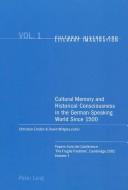
ISBN: 3039101692 0820469793 9783039101696 Year: 2004 Volume: 2 Publisher: Oxford: Lang,
Abstract | Keywords | Export | Availability | Bookmark
 Loading...
Loading...Choose an application
- Reference Manager
- EndNote
- RefWorks (Direct export to RefWorks)
Collective memory --- Literature and history --- Memory --- Social aspects --- Europe [German-speaking ] --- Congresses --- Intellectual life --- History --- Historiography --- Collective memory - Europe, German-speaking - Congresses. --- Literature and history - Congresses.
Book
ISBN: 9783825362973 3825362973 Year: 2014 Volume: 53 Publisher: Heidelberg Universitätsverlag Winter
Abstract | Keywords | Export | Availability | Bookmark
 Loading...
Loading...Choose an application
- Reference Manager
- EndNote
- RefWorks (Direct export to RefWorks)
Entgegen einer in der Forschung verbreiteten Ansicht kennt die mittelalterliche Poetik sehr wohl die reine Fiktionalität des Erzählens, beschränkt sie aber auf Fabel und Allegorie (‚fabula‘), wo bildhaft auf die Wirklichkeit verwiesen wird, und empfiehlt sonst deren unmittelbare Repräsentation (‚historia‘). Das Ergebnis ist aus unserer Sicht Pseudo-Historie, welche ein mehr oder minder solides Gerüst historischer Fakten durch Fiktion nach dem Prinzip der Wahrscheinlichkeit ergänzt. Dahinter steht die mittelalterliche christliche Überzeugung von der Einzigkeit und Vollkommenheit der gottgeschaffenen Wirklichkeit, die der Mensch weder verdoppeln noch ersetzen, sondern nur nachahmen könne. Erst in der Neuzeit werden der Glaube daran erschüttert und der Mensch frei, sich eine eigene ‚Welt im Kopf‘ zu schaffen. Das Ergebnis ist schließlich der moderne Fiktionskontrakt: Etwas wird erzählt, als ob es wahr sei, obwohl alle wissen, daß es nicht wahr ist, dieses Als-ob aber akzeptieren. Trotzdem hat – dies die hier vertretene These – Chrétien de Troyes im 12. Jh. in bewußter Umgehung der Poetik seiner Zeit aus dem Geist des subliterarischen areligiösen Märchens den rein fiktionalen Artusroman kreiert, der jedoch von den allermeisten Zeitgenossen und Nachfahren doch wieder nur für ‚historia‘ gehalten wurde, so daß die moderne Fiktionalität erst aus der parodistischen Verkehrung der Pseudo-Historie durch Ariost und Cervantes und endgültig in der Aufklärung durch Sterne und Diderot entstehen konnte.
Book
ISBN: 9782763730301 2763730302 Year: 2017 Publisher: Québec: Presses universitaires de Laval,
Abstract | Keywords | Export | Availability | Bookmark
 Loading...
Loading...Choose an application
- Reference Manager
- EndNote
- RefWorks (Direct export to RefWorks)
Literature and history --- Creation (Literary, artistic, etc.) --- Literature --- Philosophy --- Littérature et histoire. --- Création littéraire. --- Literature and history - Congresses --- Creation (Literary, artistic, etc.) - Congresses --- Literature - Philosophy - Congresses --- Littérature et histoire. --- Création littéraire.
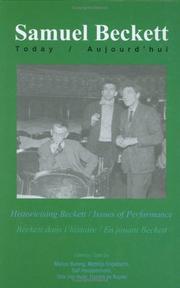
ISBN: 9042017678 9789042017672 Year: 2005 Volume: 15 Publisher: Amsterdam: Rodopi,
Abstract | Keywords | Export | Availability | Bookmark
 Loading...
Loading...Choose an application
- Reference Manager
- EndNote
- RefWorks (Direct export to RefWorks)
Beckett, Samuel --- Mise en scène --- Literature and history --- Congresses --- Beckett, Samuel, --- Criticism and interpretation. --- Literature and history - Congresses --- Beckett, Samuel, - 1906-1989 - Criticism and interpretation. --- Beckett, Samuel, - 1906-1989 - Mise en scène - Congrès --- Beckett, Samuel, - 1906-1989
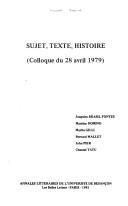
ISBN: 2251602593 9782251602592 Year: 1981 Volume: 259 Publisher: Paris: Les Belles Lettres,
Abstract | Keywords | Export | Availability | Bookmark
 Loading...
Loading...Choose an application
- Reference Manager
- EndNote
- RefWorks (Direct export to RefWorks)
Literature --- Discourse analysis, Literary --- Literature and history --- Discours littéraire --- Littérature et histoire --- Congresses --- Congrès --- -Literature and history --- -History and literature --- History and poetry --- Poetry and history --- History --- Literary discourse analysis --- Rhetoric --- Style, Literary --- Conferences - Meetings --- Congresses. --- -Congresses --- Discours littéraire --- Littérature et histoire --- Congrès --- Discourse analysis, Literary - Congresses --- Literature and history - Congresses
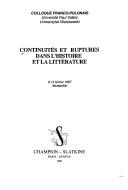
ISBN: 2051010137 9782051010139 Year: 1988 Publisher: Paris: Champion-Slatkine,
Abstract | Keywords | Export | Availability | Bookmark
 Loading...
Loading...Choose an application
- Reference Manager
- EndNote
- RefWorks (Direct export to RefWorks)
History of civilization --- Literature --- Littérature --- History and criticism --- Congresses --- Histoire et critique --- Congrès --- Polish literature --- French literature --- Historiography --- Literature and history --- History in literature --- Littérature --- Congrès --- Congresses. --- Polish literature - History and criticism - Congresses --- French literature - History and criticism - Congresses --- Historiography - Congresses --- Literature and history - Congresses --- History in literature - Congresses
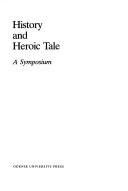
ISBN: 8774925342 9788774925347 Year: 1985 Publisher: [Odense, Denmark]: Odense University press,
Abstract | Keywords | Export | Availability | Bookmark
 Loading...
Loading...Choose an application
- Reference Manager
- EndNote
- RefWorks (Direct export to RefWorks)
Epic literature --- History in literature --- Literature and history --- History and criticism --- Congresses --- Historische poëzie. (Congres) --- Poésie épique. (Congrès) --- Poésie historique. (Congrès) --- Heldendichten. (Congres) --- Littérature et histoire. --- Épique (esthétique) --- Légendes --- Sources. --- Littérature et histoire. --- Épique (esthétique) --- Légendes --- Epic literature - History and criticism - Congresses --- History in literature - Congresses --- Literature and history - Congresses
Book
ISBN: 3406541925 9783406541926 Year: 2006 Volume: 125 Publisher: München: Beck,
Abstract | Keywords | Export | Availability | Bookmark
 Loading...
Loading...Choose an application
- Reference Manager
- EndNote
- RefWorks (Direct export to RefWorks)
Epic poetry, Greek --- History and literature --- Poésie épique grecque --- Histoire et littérature --- History and criticism --- Histoire et critique --- Homer. --- Classical literature --- Literature and history --- Congresses --- Literature and history. --- Poésie épique grecque --- Histoire et littérature --- Greek epic poetry --- Epic poetry, Classical --- Greek poetry --- Homerus. --- Epic poetry, Greek - History and criticism - Congresses --- Classical literature - History and criticism - Congresses. --- Literature and history - Congresses.
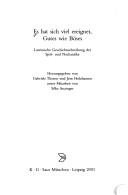
ISBN: 359877690X 9783598776908 Year: 2001 Volume: 141 Publisher: München: Saur,
Abstract | Keywords | Export | Availability | Bookmark
 Loading...
Loading...Choose an application
- Reference Manager
- EndNote
- RefWorks (Direct export to RefWorks)
Latin literature, Medieval and modern --- Christian literature, Latin (Medieval and modern) --- Civilization, Medieval --- Literature and history --- History and criticism --- Congresses --- Historiography --- Latin literature, Medieval and modern - History and criticism - Congresses. --- Christian literature, Latin (Medieval and modern) - History and criticism - Congresses --- Civilization, Medieval - Historiography - Congresses. --- Literature and history - Congresses.
Book
ISBN: 9782753580114 2753580111 Year: 2020 Publisher: Rennes: Presses universitaires de Rennes,
Abstract | Keywords | Export | Availability | Bookmark
 Loading...
Loading...Choose an application
- Reference Manager
- EndNote
- RefWorks (Direct export to RefWorks)
La 4e de couverture indique :"L'oeuvre de Plutarque a communément été utilisée comme source historique sans que l'on se soit toujours interrogé sur la nature, le sens et les modalités de la démarche du biographe de Chéronée. Cet ouvrage vise à mieux cerner la spécificité de l'écriture historico-biographique de Plutarque et à contribuer au renouveau actuel des études plutarquiennes. S'appuyant sur une approche résolument interdisciplinaire visant à distinguer le noyau historique du récit des constructions littéraires, les auteurs espèrent contribuer à une meilleure compréhension de la nature de l'oeuvre de façon à éviter les erreurs méthodologiques qu'a parfois favorisées dans le passé la confusion des genres. Ont particulièrement été explorés la tension entre rhétorique et Histoire, la place du mythe dans le récit, les processus d'idéalisation des vertus dans les Vies et les Moralia, les sources d'informations inattendues que peuvent constituer pour l'historien les écrits de Plutarque.
Légendes et histoire --- Histoire ancienne -- Historiographie --- Actes de congrès --- Historiographie --- Plutarque --- Et l'histoire --- Historiographie ancienne. --- Et l'histoire. --- Historiography --- Literature and history --- Congresses --- Plutarch --- Criticism and interpretation --- Historiography. --- Criticism and interpretation. --- Historiography - Congresses --- Literature and history - Congresses --- Plutarch - Criticism and interpretation - Congresses
| Listing 1 - 10 of 12 | << page >> |
Sort by
|

 Search
Search Feedback
Feedback About UniCat
About UniCat  Help
Help News
News